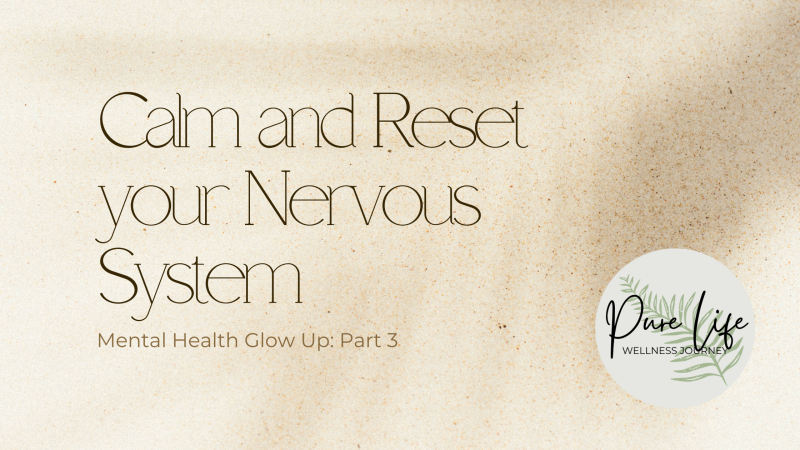
Start your Mental Health Glow Up today with our simple, step-by-step blog series designed to help you clear mental clutter, build emotional resilience, calm your nervous system, and nurture deeper connections.
Don’t wait to feel better — Keep reading!
Why Your Nervous System Needs Care
Your nervous system is the command center of your entire body — it controls how you think, feel, and respond to the world around you. When it’s balanced, you feel calm, focused, and grounded. But when it’s overworked by constant stress, lack of rest, or emotional overload, it can get stuck in “fight, flight, or freeze” mode. This chronic activation leaves you feeling anxious, tired, and easily overwhelmed.
Taking care of your nervous system is essential because it directly affects your mental clarity, emotional stability, and physical health. A regulated nervous system helps your body know when it’s safe to relax, digest, and recover. It supports better sleep, steadier energy, and clearer thinking. Emotionally, it allows you to respond to challenges with calm and confidence rather than reactivity or burnout.
When you prioritize practices that soothe your nervous system — like deep breathing, mindfulness, grounding, rest, and healthy nourishment — you’re not just managing stress; you’re teaching your body safety and self-trust. Over time, this creates a sense of inner steadiness, helping you move through life’s ups and downs with more resilience and peace.
Why Sleep is Critical for Your Nervous System
Sleep isn’t just a break from your day — it’s a vital reset for your entire nervous system. When you sleep, your body repairs tissues, balances hormones, clears toxins from the brain, and restores energy. Your nervous system, in particular, uses this time to regulate stress responses, process emotions, and consolidate memories. Without sufficient sleep, your nervous system can stay in overdrive, leaving you more reactive, anxious, and mentally foggy.
Getting quality sleep helps your body shift from a constant state of “fight or flight” to a state of rest and repair. Deep, restorative sleep lowers cortisol (the stress hormone), stabilizes heart rate, and strengthens connections between brain cells — which improves mood, memory, and focus. Essentially, every good day starts with a well-rested nervous system: it’s the foundation for emotional resilience, mental clarity, and overall well-being.
Quick Tips for Nervous System-Friendly Sleep:
-
Keep a consistent sleep schedule — go to bed and wake up at the same time every day.
-
Create a calming pre-sleep routine: dim lights, gentle stretching, or journaling.
-
Limit screens 30–60 minutes before bed to reduce overstimulation.
-
Make your sleep environment cozy, quiet, and cool.
Prioritizing sleep isn’t a luxury — it’s an essential act of self-care that keeps your nervous system balanced, your mind clear, and your emotions steady.
Simple Daily Habits to Support a Healthy Nervous System
You don’t need a complete life overhaul to take care of your nervous system — small, consistent actions can make a powerful difference over time. Try weaving a few of these calming habits into your daily routine to help your body feel safe, balanced, and at ease.

Start Your Day with Slow Breathing
Before reaching for your phone, take a minute to breathe deeply — in through your nose, out through your mouth. This tells your body it’s safe to start the day calmly rather than rushing into stress mode.
Move Your Body Gently
Whether it’s stretching, walking, yoga, or dancing, gentle movement helps release tension and regulate stress hormones. Even 10 minutes of mindful movement can reset your mood and energy.


Practice Grounding Moments
Pause throughout the day to come back to your senses — notice the feel of your feet on the floor, the air on your skin, or a sound around you. Grounding keeps you connected to the present and helps quiet racing thoughts.
Nourish with Intention
Eat balanced, nutrient-rich foods and stay hydrated. Nutrients like magnesium, omega-3s, and B vitamins support your brain and nervous system health. Avoid excessive caffeine or sugar, which can heighten anxiety and overstimulation.


Create a Soothing Nighttime Ritual
Wind down with dim lights, calming music, or gentle stretches instead of screens. This helps your body shift into rest mode, allowing your nervous system to repair and recharge while you sleep.
Reflect and Release Before Bed
Jot down thoughts, worries, or wins from your day. Journaling signals to your brain that it can let go and rest — freeing your mind from carrying tomorrow’s weight into tonight.

Reset Your Nervous System in Just 10 Minutes — 3 Easy Ways
The Body Release Reset
(Best for: when stress feels stuck in your body — tension, restlessness, or fatigue)
Minute 1–2:
Stand up and roll your shoulders, neck, and wrists. Loosen the jaw. Breathe deeply as you shake out your hands and arms.
Minute 3–6:
Move your body — stretch, do gentle yoga poses, or take a brisk walk around your space. Focus on rhythm and flow, not performance.
Minute 7–8:
Do three deep belly breaths: inhale for 4, hold for 2, exhale for 6. Let your body soften.
Minute 9–10:
Sit or lie down. Notice how your body feels — heavier, lighter, calmer. Close with a few seconds of stillness or gratitude for your body’s strength.
✨ Result: Your muscles release tension, your body finishes the stress cycle, and your energy feels reset.
The Sensory Grounding Reset
(Best for: when you feel anxious, dissociated, or overstimulated)
Minute 1–2:
Take a slow breath and look around. Name 5 things you see, 4 things you can touch, 3 things you can hear, 2 things you can smell, and 1 thing you can taste.
Minute 3–5:
Do gentle tapping on your arms, shoulders, and legs — light rhythmic taps help bring your attention back into your body.
Minute 6–8:
Hold something grounding — a stone, a mug of tea, or a soft blanket. Feel the texture, temperature, and weight as you breathe slowly.
Minute 9–10:
Close with one grounding statement like “I am here, and I am safe” or “I can come back to calm at any time.”
✨ Result: Your senses reconnect you to the present moment, easing anxiety and restoring inner balance.
The Mindful Calm Reset
(Best for: when your mind feels cluttered or you’re emotionally overwhelmed)
Minute 1–2:
Sit comfortably, close your eyes, and take slow, deep breaths — in for 4 counts, hold for 4, out for 6. Feel your shoulders drop with each exhale.
Minute 3–5:
Notice your thoughts as they pass — without judgment. Simply name them (“worry,” “to-do,” “fear”) and imagine each one floating away.
Minute 6–8:
Place your hand over your heart and ask yourself: “What do I need right now?” Listen gently — no fixing, just awareness.
Minute 9–10:
End with one positive affirmation or intention, such as “I am safe in this moment” or “I can handle what comes next.”
✨ Result: Your breathing slows, your heart rate steadies, and your mind feels clear and grounded.



Add comment
Comments